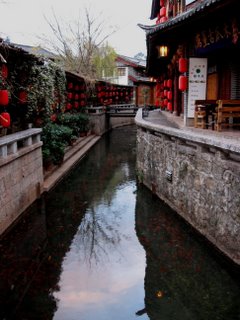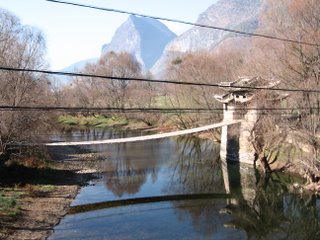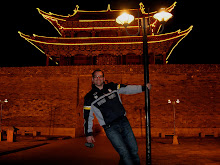Jade, Dragons, Snow and Mountains
The 'old town' of Lijiang is a tight labyrinth of narrow walkways separated by a series of meandering streams. During the day, the old town bustles with tourist traffic. Small shops sell minority clothing, jade jewelry and flutes, tea, and an assortment of other items. At night, all the red, hanging lanterns light up, giving the town a quaint, warm feel. The crowds real emerge after dark. The male and female employees of the local restaurants have nightly singing and chanting competitions. These impromptu street shows create a loud but inviting atmosphere for wandering or drinking hot-chocolate. And since none of the buildings are closed--their windows are always open during business hours--hot-chocolate can be quite inviting, along with the warm glow of the fireplaces.
 The 'iron-rainbow bridge' held a strategic placement during both the defense of China from the invading Japanese forces during World War II, but also for both the nationalist and communist troops during the struggle for power before and after WWII. This bridge crosses a tributary of the Yangtse river, and is situated on the outskirts of Shigu (pronounced 'sure goo'). Like many sites in China, this bridge cost money simply to take a picture of it. So I simply walked downstream to the modern concrete bridge and took my picture through the power lines. Shigu is situated in the mountains about an hour outside of Lijiang.
The 'iron-rainbow bridge' held a strategic placement during both the defense of China from the invading Japanese forces during World War II, but also for both the nationalist and communist troops during the struggle for power before and after WWII. This bridge crosses a tributary of the Yangtse river, and is situated on the outskirts of Shigu (pronounced 'sure goo'). Like many sites in China, this bridge cost money simply to take a picture of it. So I simply walked downstream to the modern concrete bridge and took my picture through the power lines. Shigu is situated in the mountains about an hour outside of Lijiang.
 While 'hanzi' or 'putonghua' are the official languages of greater China, the Naxi (Nah-she) people of Lijiang and the surrounding communities also speak a minority language: Dong Ba. Much more like hieroglyphics than the characters of putonghua, the Dong Ba language shows up on many signs and souvenirs. The sign below is printed in pinyin (the Enlgish version of Chinese), traditional Chinese characters, and Dong Ba pictures. With only a slight bit of imagination, one can see the similarity between the Chinese characters and the Dong Ba pictures.
While 'hanzi' or 'putonghua' are the official languages of greater China, the Naxi (Nah-she) people of Lijiang and the surrounding communities also speak a minority language: Dong Ba. Much more like hieroglyphics than the characters of putonghua, the Dong Ba language shows up on many signs and souvenirs. The sign below is printed in pinyin (the Enlgish version of Chinese), traditional Chinese characters, and Dong Ba pictures. With only a slight bit of imagination, one can see the similarity between the Chinese characters and the Dong Ba pictures.
 Hopefully you can read this short history of Lijiang. The town is approximately 800 years old and was, at one time, the principal city in Yunnan Province. As the sign says, the town is surrounded by mountains. While it is not unusual for Lijiang to receive snow, the general temperatures are only slightly cooler than Kunming, and the snow tends to be in the much higher surroundings of the rocky mountains encircling this small city.
Hopefully you can read this short history of Lijiang. The town is approximately 800 years old and was, at one time, the principal city in Yunnan Province. As the sign says, the town is surrounded by mountains. While it is not unusual for Lijiang to receive snow, the general temperatures are only slightly cooler than Kunming, and the snow tends to be in the much higher surroundings of the rocky mountains encircling this small city.
 What would a short excursion be without a picture of yours truly. In this picture, I am standing on the main street going into the old-town of Lijiang. On my right (the picture's left) the stream flows beneath that willow tree. As you may have seen in the first picture, the stream is stocked with goldfish and the occisional rainbow trout--I could not believe at first either, but when I got closer, I could see the obvious markings of that beautiful whitefish I am so used to from Montana. Over my left shoulder, in the distance, Jade Dragon Snow Mountain rises up
What would a short excursion be without a picture of yours truly. In this picture, I am standing on the main street going into the old-town of Lijiang. On my right (the picture's left) the stream flows beneath that willow tree. As you may have seen in the first picture, the stream is stocked with goldfish and the occisional rainbow trout--I could not believe at first either, but when I got closer, I could see the obvious markings of that beautiful whitefish I am so used to from Montana. Over my left shoulder, in the distance, Jade Dragon Snow Mountain rises up
over the city. An imposing mountain, the local governement used to allow skiing from the summit of the mountain's one cable car (chair lift). However, when we enquired about that possibility, a local travel agent informed us that this was no longer allowed. So I got to see Jade, Dragons, Snow and Mountains, but I still have not been able to go skiing. However, I keep hearing that there might be skiing in Zhong Dian, another three hours beyond Lijiang. Maybe next time.
 The 'iron-rainbow bridge' held a strategic placement during both the defense of China from the invading Japanese forces during World War II, but also for both the nationalist and communist troops during the struggle for power before and after WWII. This bridge crosses a tributary of the Yangtse river, and is situated on the outskirts of Shigu (pronounced 'sure goo'). Like many sites in China, this bridge cost money simply to take a picture of it. So I simply walked downstream to the modern concrete bridge and took my picture through the power lines. Shigu is situated in the mountains about an hour outside of Lijiang.
The 'iron-rainbow bridge' held a strategic placement during both the defense of China from the invading Japanese forces during World War II, but also for both the nationalist and communist troops during the struggle for power before and after WWII. This bridge crosses a tributary of the Yangtse river, and is situated on the outskirts of Shigu (pronounced 'sure goo'). Like many sites in China, this bridge cost money simply to take a picture of it. So I simply walked downstream to the modern concrete bridge and took my picture through the power lines. Shigu is situated in the mountains about an hour outside of Lijiang. While 'hanzi' or 'putonghua' are the official languages of greater China, the Naxi (Nah-she) people of Lijiang and the surrounding communities also speak a minority language: Dong Ba. Much more like hieroglyphics than the characters of putonghua, the Dong Ba language shows up on many signs and souvenirs. The sign below is printed in pinyin (the Enlgish version of Chinese), traditional Chinese characters, and Dong Ba pictures. With only a slight bit of imagination, one can see the similarity between the Chinese characters and the Dong Ba pictures.
While 'hanzi' or 'putonghua' are the official languages of greater China, the Naxi (Nah-she) people of Lijiang and the surrounding communities also speak a minority language: Dong Ba. Much more like hieroglyphics than the characters of putonghua, the Dong Ba language shows up on many signs and souvenirs. The sign below is printed in pinyin (the Enlgish version of Chinese), traditional Chinese characters, and Dong Ba pictures. With only a slight bit of imagination, one can see the similarity between the Chinese characters and the Dong Ba pictures. Hopefully you can read this short history of Lijiang. The town is approximately 800 years old and was, at one time, the principal city in Yunnan Province. As the sign says, the town is surrounded by mountains. While it is not unusual for Lijiang to receive snow, the general temperatures are only slightly cooler than Kunming, and the snow tends to be in the much higher surroundings of the rocky mountains encircling this small city.
Hopefully you can read this short history of Lijiang. The town is approximately 800 years old and was, at one time, the principal city in Yunnan Province. As the sign says, the town is surrounded by mountains. While it is not unusual for Lijiang to receive snow, the general temperatures are only slightly cooler than Kunming, and the snow tends to be in the much higher surroundings of the rocky mountains encircling this small city. What would a short excursion be without a picture of yours truly. In this picture, I am standing on the main street going into the old-town of Lijiang. On my right (the picture's left) the stream flows beneath that willow tree. As you may have seen in the first picture, the stream is stocked with goldfish and the occisional rainbow trout--I could not believe at first either, but when I got closer, I could see the obvious markings of that beautiful whitefish I am so used to from Montana. Over my left shoulder, in the distance, Jade Dragon Snow Mountain rises up
What would a short excursion be without a picture of yours truly. In this picture, I am standing on the main street going into the old-town of Lijiang. On my right (the picture's left) the stream flows beneath that willow tree. As you may have seen in the first picture, the stream is stocked with goldfish and the occisional rainbow trout--I could not believe at first either, but when I got closer, I could see the obvious markings of that beautiful whitefish I am so used to from Montana. Over my left shoulder, in the distance, Jade Dragon Snow Mountain rises upover the city. An imposing mountain, the local governement used to allow skiing from the summit of the mountain's one cable car (chair lift). However, when we enquired about that possibility, a local travel agent informed us that this was no longer allowed. So I got to see Jade, Dragons, Snow and Mountains, but I still have not been able to go skiing. However, I keep hearing that there might be skiing in Zhong Dian, another three hours beyond Lijiang. Maybe next time.



2 Comments:
I thought that skiing in Jewel Basin or Glacier looked dangerous, but this looks much more perilous.
Mom
Rolo!!! its crazy to see you actually in china!!! i didn't know you were going to such a beautiful spot... seems like theres lots of interesting history behind it:) always, liss
Post a Comment
<< Home